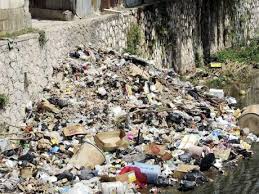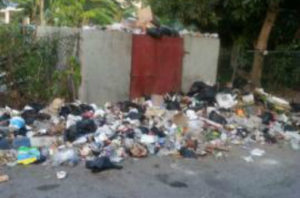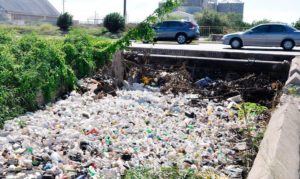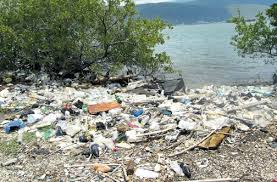I’m heartsick. I’ve been putting off this particular post for two years now, but no more. So here goes.
Dear Jamaica: We have a garbage problem. We are nasty.
We’ve perfected the art of the road trip. We can now turn on a dime and head north, south, east or west. Easy: keep vehicles properly maintained, stop at the grocery the night before or on the way out, procure water, juices, rum and chasers, nuts, cheesy snacks, granola bars, keep the igloo clean at all times, keep one bag clean and packed with cups and ground sheet at all times, and at the word go, load up and head out.
 |
| View from Black Hill, Portland |
And so we explore our island at any and every chance we get. Portland’s beaches and hills, St. Ann’s beaches, Trelawny’s beaches, rivers and beautiful vistas in its center, Negril’s beach, St. Elizabeth’s rolling landscapes and St. Andrew’s rivers and breathtaking mountainscapes.
 |
| Driving from St. Mary into Portland |
 |
| Beautiful Duncan’s, Trelawny |
 |
| Abandoned tunnel in Portland |
 |
| Paradise, aka Negril |
 |
| Black River, St. Elizabeth |
 |
| View from New Castle, St. Andrew |
I’ve been very selective in my picture taking, choosing to overlook the nastiness that coexists with the beauty that abounds everywhere.
Yesterday we drove through St. Thomas to Long Bay, Portland. Long Bay is one of the best kept secrets in Jamaica. There it sits, part of the main road through east Portie. There are no huge hotels, no fancy famous restuarants, no “attractions.” But there are always tourists there, walking on the road, sleeping in one of the many BnB’s that you can find on the internet, rolling a spliff, sucking on a cold red strip or swirling a plastic cup with ice, White rum and Ting. Heaven. The surf is rough but the water is blue and the sand is white. And it is all mere steps away from the main road. There are no loud sound systems. And tourist harassment… what’s that in Long Bay?
 |
| Long Bay, Portland |
Yesterday we simply turned in off the road, parked under some coconut trees, unpacked our igloo and grill, turned up (just a smidgen…) our music, and enjoyed a few hours in Paradise. Easy. But when we looked to our left and then to our right, there it was: garbage: styrofoam, plastic, latex, glass…ugh.
I averted my eyes quickly and kept my focus front and centre. As we left and were heading back, the garbage deposited where it ought never to be all along the coast was inescapable. I said to H: “Can you imagine if we kept Long Bay EXACTLY as it is now: humble BnBs, rustic cook shops, roadside bars, but cleaned up the garbage?”
 |
| Deep, white sand right off the main road, Long bay, Portland |
There is a lot of talk about our tourism product, creating visions of more rooms, more high prices attractions, orchestrated, pre-packaged tours, all things shiny and new. But simply cleaning up the garbage would result in a step change in what is our current vibe and what we offer to locals and visitors alike.
We visited Jackson Bay, south Clarendon about a year ago. This is way off the beaten track, winding south through wetlands. And there was garbage here. How? Styrofoam and plastic as well as scrap metal in the form of old vehicle chassis and discarded appliances. God.
Almost any hillside in upper St. Andrew is a potential dumping site: check out spots in Irish Town and Red Hills for example.
 |
| When last was garbage collected? |
 |
| When last was garbage collected? |
So how do we fix it. Huge sigh. One perspective is that leadership in Jamaica has lost the art of implementation and has become preoccupied with speeches and box-ticking. It further posits that those in positions of influence and power have managed to insulate themselves from certain Jamaican realities and therefore expend nothing on fixing those ills besetting others; think private schools, private education, private security, gated communities, vehicles that shuttle them from A to B, high off the ground in air-conditioned insularity. They vacation in exclusive locations, out of the line of sight of road side dump sites, and in all-inclusive, created experiences, totally separate from the speak-easy that exists beside a pile of garbage uncollected in two weeks. Out of sight, most definitely out of mind.
And so priorities are set based on a particular skewed perspective and outlook by the powerful and wealthy. And those who see and know and feel The Other Side of Things, in their quest for the Great House quickly adopt the priorities of those who are where they want to be, eschewing the urgent and real needs of our present context.
Dear Jamaica: we are on the cusp of an environmental crisis of humongous proportions. The garbage in and around us is piling up.
I’m unwilling to relinquish my safety, health and peace of mind so easily though. Community Action has to step to the front of the line now. Local leadership: YOUR TIME NOW! I have latched on to grass-roots activism as one of the first steps towards making our present system of governance redundant and shifting the current paradigm towards one that is more proactive and relevant to us. Yes, I know nothing can really substitute for national policies that are framed and resourced and enacted by central government as we seek to move from here to there. But I cannot wait. Jamaica cannot afford to wait.
Imagine this happening at the Community level:
1. Education campaigns about improper garbage disposal. Get a local company to sponsor a poster competition in the community schools. Tell them to include actual pictures of what is wrong in their community.
2. Again get a local company to sponsor the printing of dozens of the winning poster and then commission local groups like the 4H Club, Scouts, church youth group to strategically, and with permission place these posters in central areas.
3. Set a small goal of creating a garbage free zone in a public area enjoyed by locals and visitors alike. Make noise about it. Use social media to spread the news of this success story. Replicate this in another area.
4. Get the Councillor and MP on board: THEY have to pressure NSWMA to cart the garbage away regularly and reliably. KEEP UP THE PRESSURE! Use social media to shame and congratulate. Because make no mistake, there are those who make every effort to bag and discard their garbage properly, but their best efforts are thwarted by the non collection of their garbage! There’s no reliable schedule of collection and public skips seem to be a thing of the past.
I think one clean area, one locality doing the right thing, made visible, will result in spread of ideals and practices. Naive? Maybe. But I’m not ready to give up. And current leadership practices have resulted in Jamaica being buried and drowned in nastiness.
Dear Jamaica: We can do this. We must do this. Get Jamaica clean and keep Jamaica clean.
















